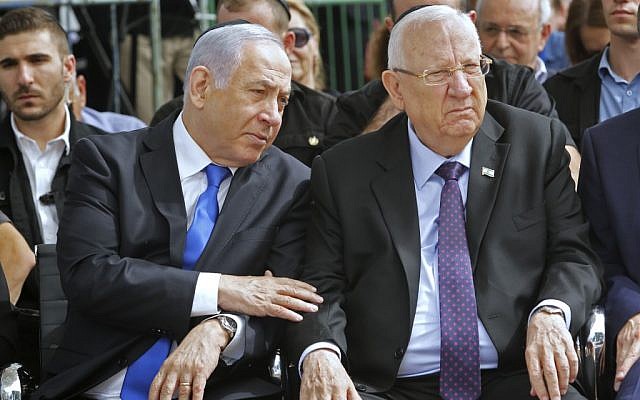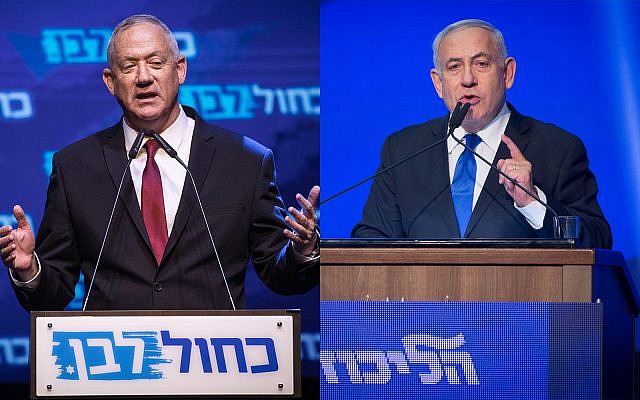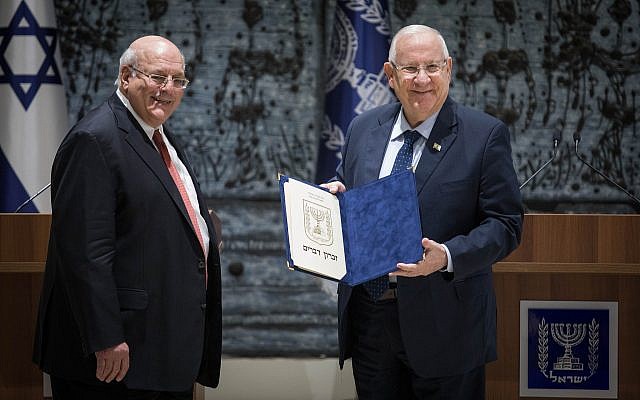President has vowed to do what he can to prevent third election in a row, but neither Gantz nor Netanyahu have a clear path to a majority

President Reuven Rivlin will begin consultations with the newly-elected Knesset factions on Sunday in order to decide who to task with forming a government after last week’s election left neither Benjamin Netanyahu’s Likud nor Benny Gantz’s Blue and White with a clear path to a majority coalition.
Israel’s president has the power to appoint one of the 120 MKs elected on Tuesday as the next prime minister of Israel. The designated lawmaker must then cobble together a coalition that wins the support of a majority of Knesset members.
Tuesday’s election ended in an apparent deadlock, with Blue and White emerging as the larger party, at 33 seats, and Likud winning 31.
By Israeli parliamentary tradition, that would grant Blue and White leader Benny Gantz the first stab at forming a coalition.
But neither party chief has a clear majority, a fact that has led both men to insist they had won the race.

Once one of them is chosen by the president, they have 28 days to present a coalition to the new Knesset and win a vote of confidence. The president is allowed to extend that period by up to 14 days.
Netanyahu on Wednesday gathered together the leaders of right-wing and ultra-Orthodox parties, and obtained their support for a so-called bloc of some 55 seats that has vowed to conduct its coalition talks as a unified faction — in the hopes of swaying Rivlin to choose Netanyahu for premier, or at least prevent Gantz from successfully forming a coalition if he is selected first.
Precedent would seem to suggest Rivlin is likely to select Gantz, but the new “bloc” has sparked speculation that Rivlin may see Netanyahu as better positioned to form a coalition.
The president has promised to do “everything in my power” to prevent the country from heading to an unprecedented third consecutive within a year.

There also remains a final and dramatic option at Rivlin’s disposal: If no candidate wins the 61 recommendations for an outright appointment, the president may decide to force a national unity government.
Can the president do that? Yes, with surprising ease.
It is completely within Rivlin’s constitutional purview to offer both Gantz and Netanyahu an ultimatum: agree to a national unity government, dividing the premiership by rotation, or see your opponent get the first chance at premier.
Rivlin’s office said Thursday the president would receive each party’s recommendation for premier, and would then meet with the recommended candidates.
The process is expected to take two days, with Rivlin meeting the parties in descending order of their Knesset size. On Sunday evening, he is set to meet with representatives of Blue and White, Likud, the Arab parties’ Joint List, Shas ad Yisrael Beytenu. On Monday morning, he is set to meet with representatives from United Torah Judaism, Yamina, Labor-Gesher and Democratic Union.
President’s Residence Director General Harel Tubi sent formal invitations on Thursday to all party leaders.
As was the case after April’s elections, “the meetings with the parties will be broadcast live on all platforms, to ensure transparency for Israeli citizens,” Rivlin’s office said.
As reported by The Times of Israel
